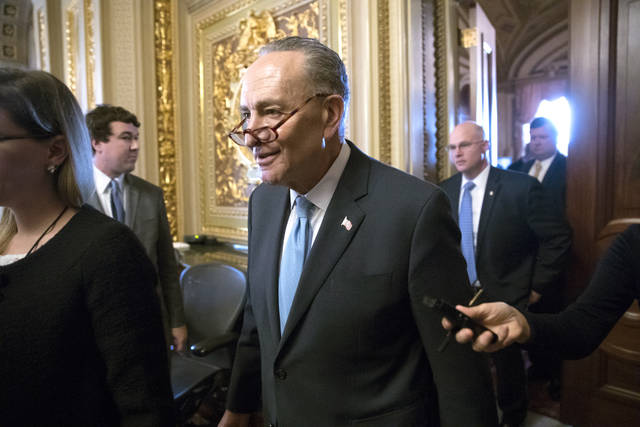NEW YORK — The first government shutdown of Donald Trump’s presidency spanned 69 hours.
That was as long as Democrats could, or would, stand united against a Republican-backed temporary spending bill in pursuit of a plan to protect hundreds of thousands of young immigrants from deportation. When the high-stakes game of chicken ended Monday evening, liberal activists were furious, Republicans were giddy, and vulnerable Senate Democrats were quietly relieved.
The episode exposed familiar political vulnerabilities for both parties — although perhaps more painfully for Democrats.
“There are no winners. There are absolutely no winners. The question is who lost the most,” said Republican pollster Frank Luntz.
——
DEMOCRATS’ DILEMMA
In the short term at least, Senate Democrats — led by Minority Leader Chuck Schumer — were pounded Monday for giving into GOP demands in exchange for a promise from Senate Majority Leader Mitch McConnell to address immigration in the coming weeks. After two days of bickering and freezing up the U.S. government, Democrats signed off on a spending bill not dramatically differently from the one on the table Friday.
No one was angrier than immigration activists, union officials and other liberal leaders, who, just a few days earlier, had helped rally Senate Democrats to take a risky political stand to protect young immigrants known as “Dreamers” from deportation.
“Last week, I was moved to tears of joy when Democrats stood up and fought for progressive values and for Dreamers. Today, I am moved to tears of disappointment and anger that Democrats blinked,” said Frank Sharry, the executive director of the immigration advocacy group America’s Voice.
Far beyond Washington, disappointment and depression rippled through the Democratic universe, which had been filled with excitement and energy just last month after a historic Senate victory in Alabama.
“They need to be called out. It was a failure of Democratic leadership,” said Christine Neumann-Ortiz, executive director of Wisconsin-based immigrant rights advocacy group Voces de la Frontera. She added, “I do not think the fight is over.”
If such disappointment persists and deflates enthusiasm in the November midterm elections, it could be a long-standing problem for Democrats. But ultimately Democratic senators bet they had bigger worries, namely turning off disaffected voters in Trump country.
For Senate Democrats running for re-election in states Trump won in 2016, the Republican charge that Democrats closed the government for the benefit of “illegal immigrants” was potent. Republicans were unusually disciplined on this messaging and Trump stayed on script.
The longer the shutdown went on, the more problematic it would become for those Democrats.
“In my focus groups, the public blamed the Democrats, even as they were angry at Donald Trump,” Luntz said.
——
REPUBLICANS’ HARD CHOICES
Yet the GOP success may be short-lived.
The legislation that ended the shutdown will fund the federal government through Feb. 8 — for less than three weeks. If there is no immigration deal by then, McConnell said he would allow the Senate to bring up legislation addressing the fate of those 700,000 young immigrants in the country illegally who had voluntarily enrolled in the Obama-era Deferred Action for Childhood Arrivals program, known as DACA, which Trump ended last fall.
There is no more explosive issue for Republicans than immigration.
Many conservatives dismiss any legal protection for the young immigrants as “amnesty.” And while some Senate Republicans have promised to support a DACA fix, the issue is far more divisive in the House, where a relatively small group of hard-line conservatives wield significant clout.
House conservatives in 2013 helped kill legislation that would have provided a pathway to citizenship for millions of immigrants in the country illegally.
The Senate’s “Gang of Eight” that crafted the bill — a group that included Republicans Marco Rubio of Florida, Lindsey Graham of South Carolina and Arizona’s Jeff Flake and John McCain — is still hated by many conservatives, many of Trump’s most passionate supporters among them.
Long-term, there will be tremendous pressure on Republicans, particularly Trump and House Speaker Paul Ryan, to come to an agreement on behalf of those thousands of Dreamers, said Democratic pollster Paul Maslin.
“Trump’s been all over the map on this, and Paul Ryan is cowed by his majority,” Maslin said, predicting Republicans aren’t capable of coming up with a legislative fix for DACA and may think they have no reason to do so. He added, “I’m not sure they are sufficiently nervous about what Latino voters are capable of doing to them in November.”
“I don’t think people in either party do very well in November if they’re the party that allows deportations of young people to take place,” said Pennsylvania Sen. Bob Casey, one of several Democrats up for re-election this fall in states Trump won in 2016. The GOP risks losing the House and Senate unless they are “thoughtful and compassionate when it comes to these young people,” he said.



